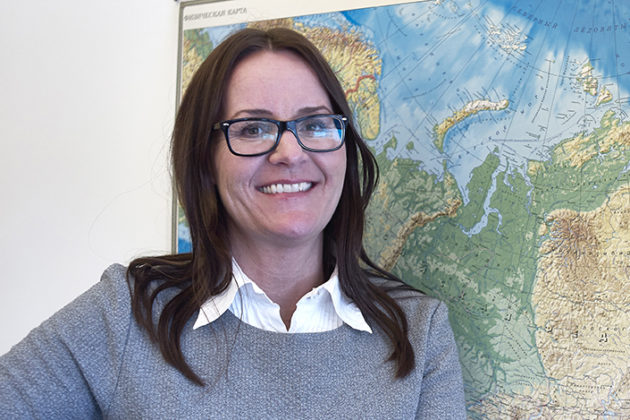“Keep Russian relations warm”

“Norwegian seafood exporters should cultivate their relationships with their Russian customers even though there is a ban on imports,” says market researcher Gøril Voldnes.
In 2013 Russia was the largest market for Norwegian seafood, and purchased 295,000 tons at a value of more than NOK 6.5 billion, according to figures from the Norwegian Seafood Council. However, in August last year Russia banned imports of Norwegian seafood, as a consequence of the international sanctions against Russia.
It is not the first time Norwegian exporters have experienced a stop in exports to Russia. But although it is uncertain when trade can resume, researcher Gøril Voldnes believes it is important to maintain interest now.
Personal relationship – key to success
“Personal relationships are more important than contracts to the Russians. They don’t care about fancy company presentations, but gain confidence in those who are willing to invest in a personal relationship. This is why Norwegian exporters should not wait to cultivate their customers until the authorities have changed their minds,” Voldnes says.
She has recently defended her doctoral thesis on trade relations across international borders, and has investigated how cultural differences between Norway and Russia influence trade between the two countries. Despite the rise in the number of global markets, there is little research on cross-cultural trade relations. Voldnes conducted in-depth interviews with Russian seafood importers and Norwegian exporters.
Both Norwegians and Russians agreed that trust is important in good trade relations, but they had differing perceptions on how to obtain the trust of others.

Time is money
While Norwegians base trust on information about the business and feel bound by contracts and agreements, this is less important to their eastern counterparts.
“Russians are not concerned with the business’s key figures. They have more trust in an individual that spends time with them and who shares personal information. Norwegians will often feel that such commitments are short-term,” Voldnes says.
In Norway there is often a sharp distinction between work and personal life, while this is alien to a Russian. One Russian importer stated: “Norwegians leave work at four to pick up their kids from day care, while we Russians are at work around the clock. It may be good for their family life, but it isn’t good for business.” A Norwegian exporter had also heard that his Russian contacts found it strange that he had to call home in order to get permission to take the Russians out for dinner in the evening.
Such cultural differences can be decisive for trade relations.
Different perceptions of differences
Norwegians and Russians agree on what is required for a successful relationship. One must have trust, mutual commitment, good communication and an even balance of power. However, the parties differ in opinions on how this is to be achieved.
With regard to communication and sharing information, the Russians say: “We have an open tone, and discuss everything with our Norwegian partners”, while the Norwegian exporters say: “The Russians are like clams, and we can’t get any information from them.”
Voldnes’ study also showed that Russians and Norwegians have different perceptions of the cultural differences between themselves. The Norwegians experienced major differences, while the Russians had a different impression. While the Russians stated: “We and the Norwegians are so similar. We experience no differences apart from language,” Norwegian exporters claimed that “Russia is a world apart.”
Uneven balance of power – OK?
One commonly assumes that a business relationship must have an even balance of power in order to work well. Relationship marketing theories also emphasize that both parties must attempt to adapt to the other in order for the relationship and business to succeed. However, Gøril Voldnes’ research indicates that other solutions may also be viable.

Both the Russians and Norwegians Voldnes interviewed said that an even balance of power was important for the satisfaction of both parties. However, following Russia’s import ban on Norwegian salmon in 2006, which gradually came to include other species, the Russians have had the upper hand and have demonstrated a willingness to use it. Norwegian exporters claimed that during negotiations they had been faced with threats that export licences could be revoked.
But why are the Russians inclined to exploit their position?
“The Russian culture has a more hierarchical social structure and a higher tolerance for an uneven distribution of power than we have. Norway is known for a much flatter, democratic structure,” Voldnes explains.
The uneven balance of power between the two cultures has the consequence that it is largely the Norwegian exporters who adapt to the Russian way of doing business.
“Despite unilateral adjustment on the part of the Norwegians, Norwegian exporters and Russian importers have found a way to operate that satisfies them both. Perhaps this is purely down to economics – that both parties have profited from the trade relationship.”
However, currently trade in seafood between Norway and Russia is at a complete standstill, and this is trade with traditions as far back as the days of the Vikings. The situation is temporary, and it may be wise to listen to the researcher’s advice on keeping the relationships with Russians warm.